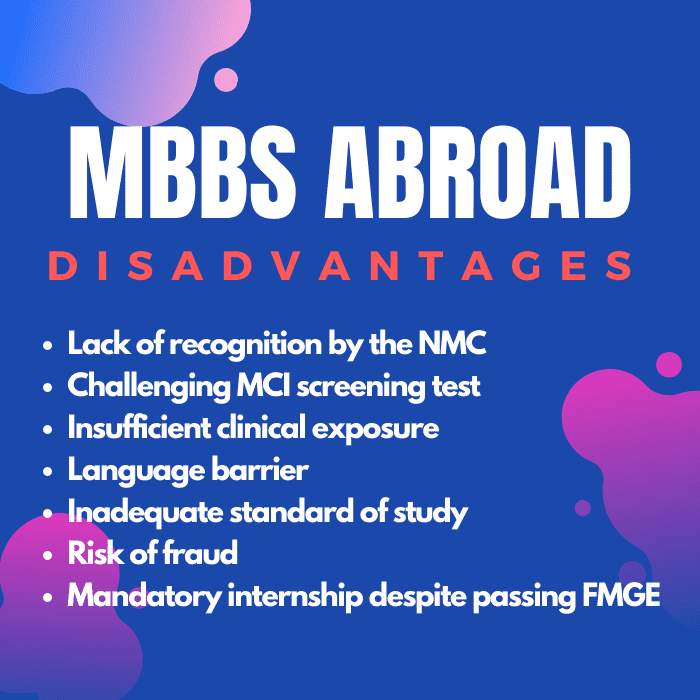MBBS is the first step you take towards entering the field of medicine and becoming a doctor. One of the most sought-after careers in today’s society.
Aside from high competition and an enormous number of NEET applicants competing for government medical seats, private medical colleges levy high fees, making medical education difficult to afford.
These factors contribute to the decision of many students to study medicine abroad, where the cost of medical education is slightly lower than at private medical colleges in India.
Disadvantages of Studying MBBS Abroad
Lack of recognition by the NMC
NMC (National Medical Council) doesn’t recognize medical degrees from any other country except for 5 English-speaking developed countries, United States, United Kingdom, Canada, Australia and New Zealand. Studying in the above countries can be extremely expensive.
That’s why every year, more than 10,000 Indian students go to countries such as China, Ukraine, Russia, Philippines, Kyrgyzstan, Georgia, Bangladesh, Kazakhstan, Poland, Armenia, Nepal, and others to pursue undergraduate medical courses.
Studying in the above countries requires one to pass the FMGE (Foreign Medical Graduate Exam) or MCI Screening Test which is a licensing exam required to practice in India. It is conducted by the National Board of Examination (NBE).
Challenging MCI screening test
Foreign Medical Graduates Examination (FMGE), also known as the MCI (Medical Council of India) Screening Test, is a licensure examination conducted by the National Board of Examinations (NBE).
In order to practice medicine in India, an Indian citizen with a medical degree from an institution outside the country must pass the test.
Questions will be asked from the comprehensive and vast MBBS syllabus (with 19 subjects). It is a demanding and challenging exam.
Based on the data collected from NBE, the number of medical students from many countries attempting FMGE has been increasing while the passing rate is consistently around 10% on average. This translates to about 1 in 10 students passing the exam! 😮
Insufficient clinical exposure
Without adequate exposure to patients, medical education is incomplete. Regardless of how well you understand clinical and non-clinical concepts, if you do not apply them to patients, you will always only gain an incomplete understanding.
The density of the population in some countries is very low, which results in an extremely low patient exposure level.
There are also some countries that do not even offer internship opportunities in hospitals due to their high student intake and lack of infrastructure to accommodate them all.
Upon their return to India, these students find it difficult to compete with other students and are unable to clear the FMGE exam despite multiple attempts.
Language barrier
You will not face serious problems if you are migrating to one of the English-speaking countries, but still, you may have trouble understanding the slang and accent.
However, if you are migrating to a non-English-speaking country, you will face a tougher challenge.
Learning the local language is necessary if you wish to study in a country where English is not the native language. One needs a good command of the local language in order to interact effectively with patients.
It is also important to be aware that the faculty may not be fluent in English in some countries.
Inadequate standard of study
We talk about so many countries when we talk about MBBS abroad, and it’s obvious that we can’t generalize the quality of education in each of them. They are all different in terms of pros and cons.
But a lack of quality in education is apparent, and books and syllabi are not completely in line with mainstream universities in India.
There is a lot of room for improvement in teaching, and students must be self-motivated in order to learn anything.
The examinations aren’t very challenging and don’t require students to work very hard.
Risk of fraud
There is a high probability that you will meet someone who will mislead you. Some will assist you, but most won’t. Hence, you should do your own thorough research rather than blindly follow others.
It is also advisable not to trust anyone who promise to get you in since they will most likely get a commission for your admission.
Students are kept unaware of extreme climatic conditions in some countries, as well as the bi-lingual nature of most universities’ teaching languages.
Parents are shown a lower cost of education by undervaluing the base currency, and many expenses are not even included.
Mandatory internship despite passing FMGE
Despite qualifying in the FMGE exam, candidates are still required to apply for an internship at an NMC-registered medical college in India.
One year is the duration of the internship. It will be only then that he or she will be permitted to practice.
Summary:
Studying MBBS abroad involves a great deal of uncertainty and risk since the pass percentage in FMGE is incredibly low, expenses are high, and the NMC recognizes only a handful of countries’ medical degrees.

Related Posts:
